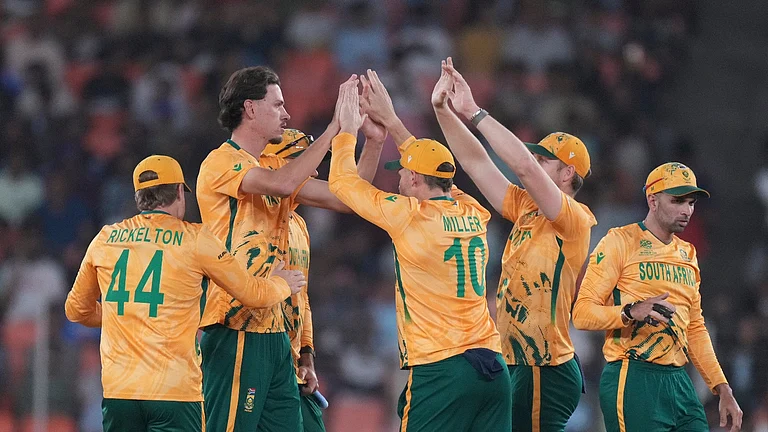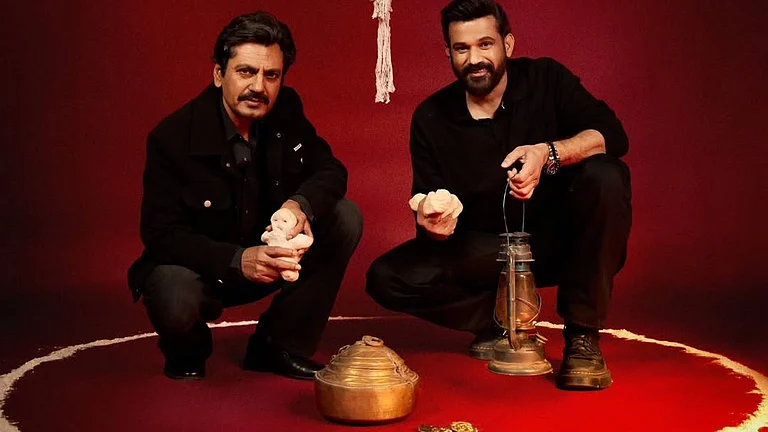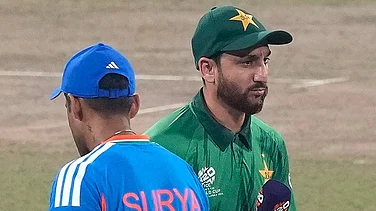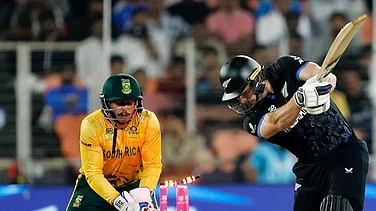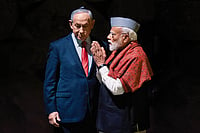(Note: This story was originally published in November 2022 and is being replugged now in light of recent developments in Pakistan)
Imran Khan is out on the streets of Pakistan breathing fire and brimstone, with thousands of his adoring supporters stomping and cheering their leader’s every word. He is doing what he does best, leading a long march to Islamabad demanding early elections to send the government of ‘looters’, led by Prime Minister Shehbaz Sharif, packing. The man who was widely believed to have come to power in 2018 riding on the coat tails of the Pakistani Army is now taking on the powerful military establishment.
This is Imran Khan in his latest avatar, a far cry from the sporting icon who won the Cricket World Cup for Pakistan in 1992. Or, the playboy who dated the most glamorous women, married Jemima Goldsmith, daughter of an English millionaire, and had a love child out of wedlock with American heiress Sita White. The transformation of Khan from a dashing cricketer, whose private life provided the British tabloids with endless fodder, to a philanthropist who built one of Pakistan’s best-equipped cancer hospitals, to a politician who became the prime minister and is now the most popular man in the country is a dramatic tale. If elections were held today, the general perception in Pakistan at the moment is that he will win it hands down, if his recent success in Punjab and several other by-polls held since he was ousted from power is any indication.
Not that Imran Khan is the first sportsperson to take to politics. In this part of the world where cricketers are like demi-gods, others have tried their luck. Most of them have, however, failed to make any mark. Certainly, none of them has risen to the highest office.
The only other sportsperson in the same league as Khan is former footballer George Weah, the President of Liberia. Weah, however, has been involved in politics for many decades and took a major part in ending the civil war in his country. Unlike Weah, little is known of Khan’s political views before he launched his own party, Pakistan Tehreek-e-Insaf, in 1996.

Khan was not only the hero of Pakistan but also a rage in India. During his playing years, he was a frequent visitor to India and claims that he knows the country better than any other Pakistani. Parmeshwar Godrej was a friend. After Khan’s 2013 march to Islamabad, he flew to Mumbai to rest. His critics in Pakistan flashed pictures of a bare-bodied Khan relaxing in the pool in the Godrej home. Khan was a guest at actress Simi Garewal’s successful celebrity TV show Rendezvous with Simi. She said in a recent tweet after Khan lost the vote of no-confidence, “#ImranKhanPrimeMinister exit teaches: 1. A joint opposition can dismiss a popular Prime Minister. 2. Politics is no place for idealists. (I’ve known Imran for 40 yrs & idealism is at his core). He may have other failings, but corruption is not one of them.’’
Ayaz Memon, a well-known cricket writer who has covered nearly all of India–Pakistan matches Khan played, had this to say. “Imran Khan certainly had outstanding leadership qualities and inspired his team to play out of their skin. He commanded complete loyalty but remained aloof. He was not one of those backslapping friendly captains, and was someone the team looked up to but acknowledged that they did not socialise with him.’’ Though not an aristocrat, Khan came from a well-heeled background, unlike most of the boys who played under him. He was well educated and studied at Oxford, was part of British high society and through his first wife Jemima was friends with Princess Diana.
Memon recalls that Khan spoke of neutral umpires much before they became part of the game. As captain, he sought non-Pakistani umpires for the India–Pakistan series in 1989. His argued that if Pakistan won, there would always be questions about the decisions taken by home umpires.

Khan was also known for his steely determination, which he has carried to politics. However, his first foray into electoral politics was a disaster and many felt he could never make it. Till his party’s victory in 2018, Khan’s electoral fortunes were dim. Around that time, Memon was doing a cricket commentary with one of Khan’s protégés and the conversation veered to the former captain. “No, he won’t give up, he never does, whether politics or cricket or anything else he puts his mind to. He will continue till the end.’’ He had told this correspondent in an interview after he lost all seats in his first shot at electoral politics. “I will be prime minister of Pakistan one day, you wait and watch.” This was in 1997.
That defines the man, and he did not have to wait long.
Khan made his debut in international cricket for Pakistan at the age of 18 in a series against England. He did not play much domestic cricket, but he would fly in from England to be with the team just ahead of the matches. He called the shots and cricket officials were in awe of him, so were most of his fellow countrymen.
“There was no mistaking his sense of entitlement though. He would sit out a series if he thought it too hot to play, or if the opposition weak,’’ observed London-based cricket writer Osman Saimuddin in a long essay on Khan in 2018. He recounts, “Imran was this feudal, lording over the game like it was his land. There’s a great story for this, of a team selection meeting at the 1992 World Cup, conducted in the inverse of a shooting squad executing a single unfortunate. Rising from the massage table, towel-clad, Imran pointed out from the 15 or 16 assembled in front of him the four or five to be put to sporting death, leaving 11 fortunates to survive and play. A tale yes, but really an imprint.’’

Christopher Sandford, one of Khan’s biographers, noted that his celebrity status began soon after he was on the cover of Cricket International with a bunch of other young cricketers. The write-up heralded the advent of a new era of cricket away from the staid stereotypes that had dominated the gentleman’s game. This young bunch of players was into fashion and pop music. Khan was photographed in a tight silk shirt and ‘gaudy’ trousers and exuded a raw sexuality which set him apart. That was the beginning of his advent as the sex symbol of cricket. His colourful personal life added to his image as a playboy. Apart from royalty and a bevy of beauties, Khan hobnobbed with big names including John Major, Nelson Mandela, Eric Clapton and Mick Jagger, among others. General Pervez Musharraf is said to have offered him the prime minister’s post but Khan declined.
Khan’s journey from a high-profile cricketer to an anti-US right-wing politician is something few can understand. He accuses the Biden administration of manipulating his ouster in April with the help of discredited Opposition parties like the Pakistan People’s Party and the Pakistan Muslim League. The surprise is that many Pakistanis buy his narrative. When the Taliban entered Kabul last August, Khan praised the group for breaking the shackles of slavery. Osama bin Laden was a ‘martyr’ to him. All this has endeared him to the religious right in Pakistan and his sympathy for the Taliban cause was so well known that he was dubbed Taliban Khan by his critics.
But his real journey possibly began with his philanthropic work and the energy he put into mobilising funds for the Shaukat Memorial Cancer Hospital in Lahore. The year 1985 was a watershed for him, when he lost his mother Shaukat Khan to cancer. Her illness gave him a first-hand view of the devastation the disease caused. Khan came across many poor patients while tending to his mother. After her death, he was determined to build a world-class cancer hospital, where the poor could get free treatment. In a few years, he raised $25 million. But what made him take the final plunge into politics is not known.
Khan remains an enigma. He is said to be extremely superstitious and is guided by his third wife Bushra Bibi, his one-time spiritual guru. It is also said that he married Bibi after she had a dream where she was told that Khan would be the Wazir ē A’z.am if he married her. The prophecy came true in 2018.









